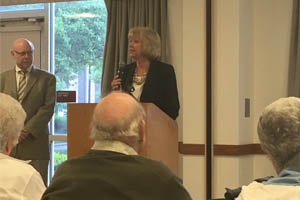- Details
- Category: Latest News
 DEERFIELD – State Senator Julie Morrison (D – Deerfield) was joined by numerous human services providers, seniors benefiting from the Community Care Program and other governmental officials at the Weinberg Community for Senior Living in Deerfield this afternoon in calling for the governor to sign Senate Bill 2038, a bill on the governor’s desk that would provide more than $700 million to Illinois’ human services providers.
DEERFIELD – State Senator Julie Morrison (D – Deerfield) was joined by numerous human services providers, seniors benefiting from the Community Care Program and other governmental officials at the Weinberg Community for Senior Living in Deerfield this afternoon in calling for the governor to sign Senate Bill 2038, a bill on the governor’s desk that would provide more than $700 million to Illinois’ human services providers.
“Our human services providers have been stretched thin and they need relief now,” Morrison said. “I urge the governor to sign Senate Bill 2038 to get some money flowing to our providers.”
Senate Bill 2038, which passed the Illinois House and Senate on May 12 and was sent to the governor on May 18, was passed to provide stopgap funding for providers that weren’t covered under court orders mandating state payments.
- Details
- Category: Latest News
 SPRINGFIELD – A plan that would make it easier for domestic violence victims to file temporary orders of protection passed the Senate this afternoon.
SPRINGFIELD – A plan that would make it easier for domestic violence victims to file temporary orders of protection passed the Senate this afternoon.
“Survivors of domestic violence or abuse often have a very difficult time coming forward and reporting their abuse,” State Senator Julie Morrison (D – Deerfield) said. “In instances where there is an immediate threat to the safety of an individual, filing a temporary order of protection is vitally important.”
House Bill 6109 would permit the Illinois Supreme Court to establish a pilot program that would allow individuals to electronically file petitions for temporary orders of protection. Currently, a person must appear in a civil court to file a petition for an order of protection.
- Details
- Category: Latest News
 SPRINGFIELD – For many patients suffering from chronic medical conditions, including cancer, multiple sclerosis, mental illness or chronic pain, finding the right medication for treatment of serious symptoms can be difficult. For patients who do find a medication that works for them, staying on that medication is vital.
SPRINGFIELD – For many patients suffering from chronic medical conditions, including cancer, multiple sclerosis, mental illness or chronic pain, finding the right medication for treatment of serious symptoms can be difficult. For patients who do find a medication that works for them, staying on that medication is vital.
State Senator Julie Morrison (D – Deerfield) passed a plan out of the Senate yesterday afternoon that would give more flexibility to patients who are benefiting from a certain drug but are required by their insurance company to take a less-costly medication.
“Patients who have been prescribed a certain medication by their doctor should not have to jump through hoops with an insurance bureaucrat to get their medicine,” State Senator Julie Morrison (D – Deerfield) said. “This proposal is the culmination of a yearlong negotiation process that I am proud to say is an agreement between the insurance industry and patient advocates.”
- Details
- Category: Latest News
SPRINGFIELD – State Senator Julie Morrison (D – Deerfield) released the following statement after voting yesterday in support of Senate Bill 2038, a bipartisan spending plan that would allocate $714 million to Illinois’ struggling human service providers:
“Yesterday’s vote is crucial for the hundreds of nonprofit organizations that are struggling to maintain services and keep their doors open. Programs serving individuals with autism, the homeless and sexual assault survivors are vital to thousands of Illinoisans who rely on their care and support. I urge the governor to sign this bill immediately and provide relief to our struggling providers.”
More Articles …
Page 63 of 97





